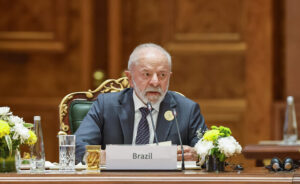
Published 27/03/2025 12:48 | Edited 27/03/2025 13:30
The popularity of Argentine President Javier Milei has had a strong drop in recent months. Research released by the University of San Andrés on Monday (25) shows that 61% of the population is dissatisfied with the direction of the far right government.
The approval rate has dropped nine percentage points since November, from 54% to 45%.
According to the survey, dissatisfaction reaches all age groups, genres and social classes. Among young people aged 18 to 27, it reaches 66%. Among Argentines aged 28 to 42, the rate is 67%.
In the 43 to 59 years segment, the index rises to 71%, and among the elders, over 60, reaches 53%. Dissatisfaction is also disseminated among all social strata: disapproval ranges from 46% to 57% between the upper classes (ABC1), medium and low.
The most criticized public policies are the management of education, health and the absence of investments in public works. As for the greater concerns of the population, insecurity, poverty and low wages stand out. Only 15% of respondents considered inflation as the main problem today.
The fall in future expectation is also remarkable: optimists are 39%, compared to 33% of pessimists. Nevertheless, the research reveals that Milei’s personal image is still one of the least deteriorated within the government: its negative differential is 7 points, while other management members face even greater rejections.
The retreat in popularity occurs after a series of scandals and controversial measures. The most rumor of them was the so -called cryptogate, the scandal around the $ Libra cryptocurrency. Milei promoted the asset on his social networks in February, causing a speculative explosion and then a collapse that left thousands of injured investors.
The case led to investigations in Argentina and the United States, as well as an impeachment request from the opposition.
The situation worsened when messages attributed to the creator of cryptocurrency, Hayden Davis, in which he claims to have “control” about the Argentine president through payments to his sister, Karina Milei.
“I send money to your sister and he signs what I say and do what I want,” says one of the messages obtained by the newspapers The nation. Casa Rosada denies any involvement of Karina and states that there was no irregularity.
Another factor of wear was Milei’s decision to appoint two new judges to the Supreme Court by decree without passing the Senate. The measure generated a strong reaction of opposition and sectors of the conservative field itself, such as former President Mauricio Macri, who stated: “The appointment by decree impairs confidence in justice.” The gesture was classified by senators as an “institutional blow.”
Violent repression of protests also contributed to wear. On March 12, a demonstration of retirees against social security cuts was harshly repressed by police in front of Congress. The act ended with 124 prisoners, 53 injured and a serious journalist after being hit by a tear gas cartridge.
“We need freedom of the press, as the National Constitution says, and no longer harmed,” said Alejandra Bartoliche, vice president of the Argentine graphic reporters Association.
The Inter -American Commission on Human Rights (IACHR) expressed concern about repression. “The Argentine State must guarantee the rights to freedom of expression and association, and employ human rights -based protocols regarding the use of force,” he said in a statement.
On Memory Day, March 24, a massive march took the Plaza de Mayo and gathered about 400,000 people. Protesters criticized the Milei government, demanded justice to the 30,000 missing from the military dictatorship, and denounced attacks on democratic rights and guarantees. “Today, Plaza has shown that the dictatorship is not over. Malei is heir to Videla, but the people will not shut up,” said Peace Nobel Prize Adolfo Pérez Esquivel.
In the midst of the crisis, the president tries to support his economic adjustment speech. According to Indec, Argentine GDP retreated -1.7%in 2024. The retraction was pulled by falling private consumption (-4.2%) and investments (-17.4%), despite the increase in exports. The government argues that the adjustment has reduced inflation, but data show growth in poverty and wage losses.
The fall in Milei’s popularity may affect the electoral claims of the La Libertad Avanza coalition. In November, polls indicated that the president’s party could get 42% in the 2025 legislative elections. Now, the peronist opposition sees in wear a window to reorganize its foundations and expand alliances.
Although the President follows the support of business sectors and the commercial press, the accumulation of crisis points to a scenario of growing instability. Milei’s popularity, which was once the strongest asset in his government, seems to have entered the collapse route – as well as the currency he helped promote.
Source: vermelho.org.br

